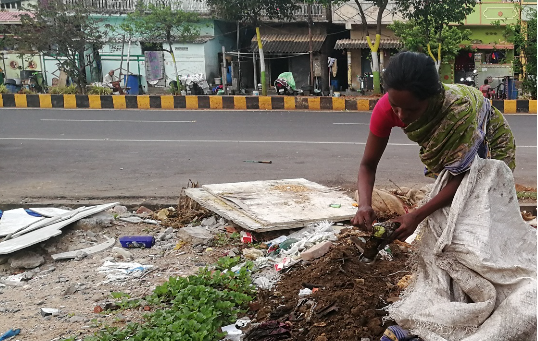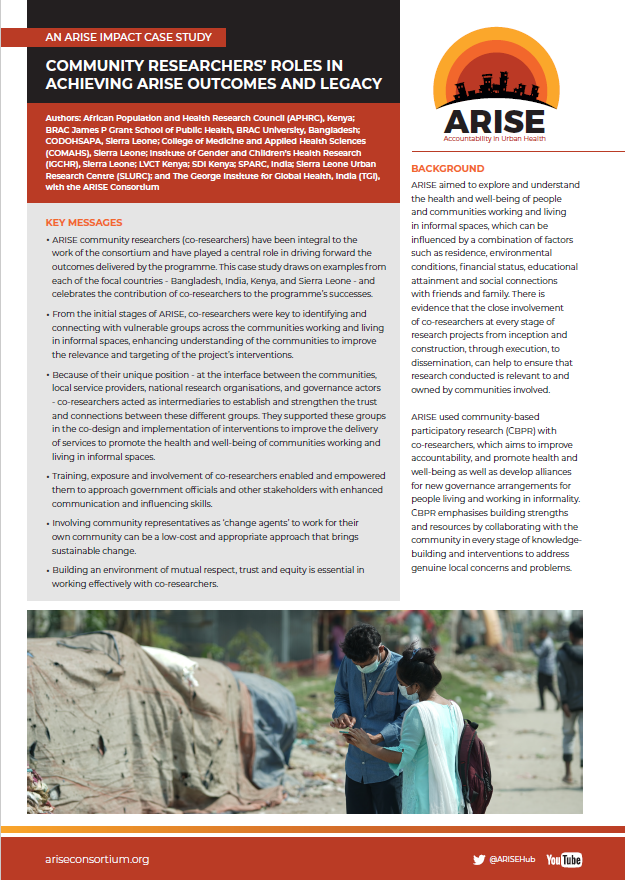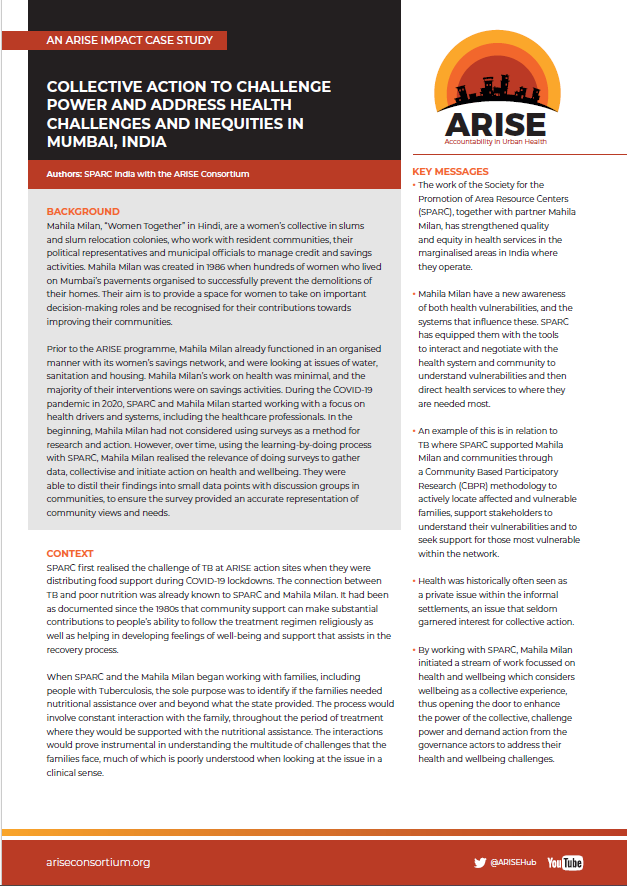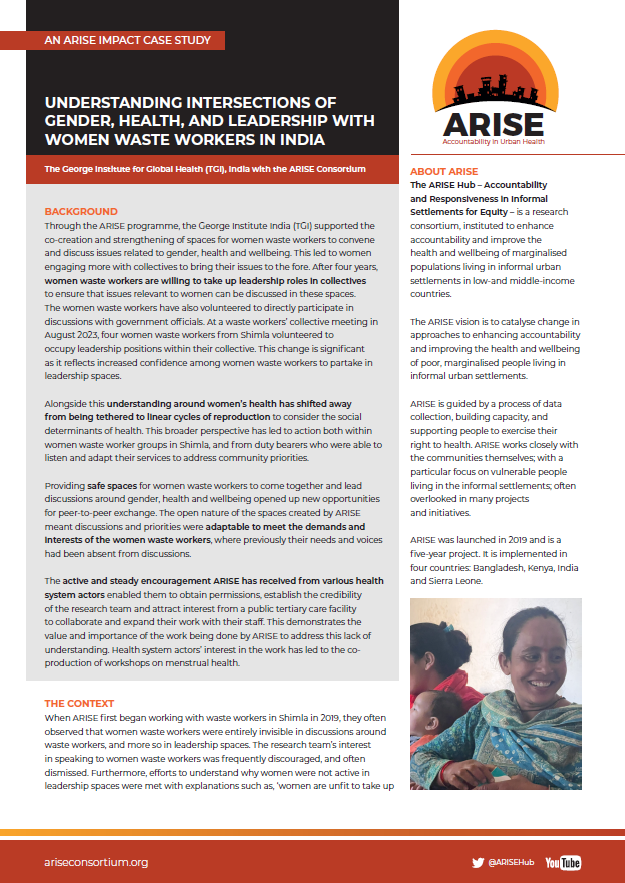India
General context
Although we know that tens of millions of Indian households live in informal settlements and that this is growing, we do not have accurate figures. The 2011 census, suggested that 13.92 million households lived in informal urban settlements – a growth of 37.1% over the previous decade. Or 93 million people according to Government of India (2010), Report of the committee on slum statistics/census, Ministry of Housing and Urban Poverty Alleviation. Either way soon the country will be predominantly urban.
Around half the ‘slums’ in India are not recognised by the government, they have ‘non-notified status’. This creates barriers to legal rights and basic services such as water, sanitation, and security of housing tenure. India’s cities have been called the ‘engine of the country’s growth’. But poor living conditions affect productivity and human capital development.
The urban poor are experiencing shrinking livelihoods and rising cost of living. Women and men bear the brunt of the additional work required to survive in different ways. Women’s labour to improve the health of the household, for example by collecting water and queuing for ration cards, is often unrecognised and undervalued.
Most households living in informal settlements have experienced direct state violence in the form of evictions. Pressure on land in cities is growing, partly due to climate change adaptation plans and increasing land value. This is likely to escalate threats of eviction in future as informal settlements are usually located in vulnerable environments, such as those at risk of flooding or landslides.
Health and social issues
Close living quarters, poor sanitation, and lack of access to drinking water are likely to drive ill health over and above the effects of simply being poor. Crowding, for example, tends to promote the transmission of infectious diseases. Other health problems include chronic and non-communicable diseases such as diabetes, related to poor diet, and mental health problems due to the stresses in an uncertain environment. These health challenges are exacerbated by the illegality and social exclusion experienced in informal urban settlements, poorly regulated and ineffective health services, exposure to environmental hazards, and a lack of clarity regarding which level of the Indian Government is responsible for protecting and promoting the health of the poorest urban residents.
One study that looked at health in non-notified and notified informal settlements in Mumbai found worse health outcomes in the non-notified settlements. This was also true for educational status and adult nutrition. It concluded that these citizens are ‘off the map’, invisible to government officials, and as a result denied access to basic services.
Governance
Urban governance in India tends to be complicated by the fact that government authorities often compete with non-state institutions that aim to govern access to and use of resources, such as land for housing, services, jobs and urban space, in more or less criminal ways. There are many state actors, including different levels and branches of local, municipal and national government. One of the major challenges for the urban poor is navigating this complex web of governance to gain access and entitlements to tenure, amenities and services.
Community mobilisation and action are vital to claiming rights. The National Slum Dwellers Federation (NSDF) mobilises the urban poor to come together, articulate their concerns and find solutions. Mahila Milan – ‘Women Together’ in Hindi – aims to provide a space for women to take on important decision-making roles. With support from SPARC (Society for the Promotion of Area Resource Centers), the NSDF and Mahila Milan identify what urban poor people can do to solve problems, and then demand state accountability in the areas where they cannot. Gathering key information is an important basis for establishing recognition and legitimacy: mapping informal urban settlements and developing collective knowledge of which services are available before negotiating with government agencies. Called the ‘Know your City’ campaign, this approach has been rolled out from India across a network of federations of informal urban settlement dwellers internationally, known as SDI.
Read more
Laura Nolan. Slum Definitions in Urban India: Implications for the Measurement of Health Inequalities. Popul Dev Rev. 2015 March ; 41(1): 59–84. doi:10.1111/j.1728-4457.2015.00026.x.
Subbaraman R, O’Brien J, Shitole T, Shitole, S, Sawant,K, Bloom DE & Gamble CJ. Off the map: the health and social implications of being a nonnotified slum in India. Environ Urban. 2012 October ; 24(2): 643–663. doi:10.1177/0956247812456356.
Posts on India

Systems of Waste: Documentaries exploring the lives of sanitation workers and waste pickers in India
Earlier this year our partner, The George Institute, India, created a series of short documentaries as part of the ARISE project. These films explore the lives and experiences of garbage collectors, sanitation workers and waste pickers, and their significance in the context of sanitation and public health. The films were produced in English and local […]

Impact Case Study: Community researchers’ roles in achieving ARISE outcomes and legacy
ARISE aimed to explore and understand the health and well-being of people and communities working and living in informal spaces, which can be influenced by a combination of factors such as residence, environmental conditions, financial status, educational attainment and social connections with friends and family. There is evidence that the close involvement of co-researchers at […]

Impact Case Study: Collective action to challenge power and address health challenges and inequities in Mumbai, India
Mahila Milan, “Women Together” in Hindi, are a women’s collective in slums and slum relocation colonies, who work with resident communities, their political representatives and municipal officials to manage credit and savings activities. Mahila Milan was created in 1986 when hundreds of women who lived on Mumbai’s pavements organised to successfully prevent the demolitions of […]

Impact Case Study: Understanding intersections of gender, health, and leadership with women waste workers in India
Through the ARISE programme, the George Institute India (TGI) supported the co-creation and strengthening of spaces for women waste workers to convene and discuss issues related to gender, health and wellbeing. This led to women engaging more with collectives to bring their issues to the fore. After four years, women waste workers are willing to […]